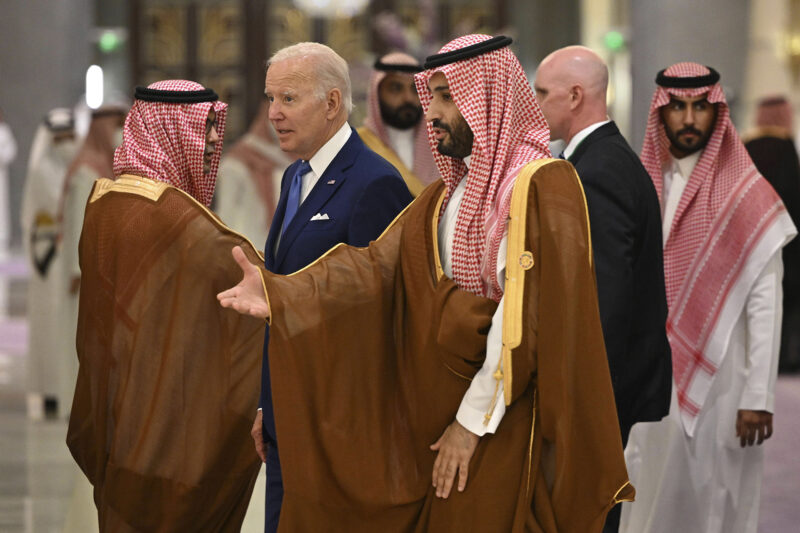An investigation by Washington-based national security reporter Ellen Knickmeyer revealed the extent of Saudi Arabia’s much-expanded surveillance, harassment and punishment of its own citizens on U.S. soil. She provided compelling details, including the previously unreported story of a Saudi sentenced to 30 years imprisonment because of calls he had made to his family from Boston, and of FBI agents warning exiles not to return home or enter the embassy in Washington.
The story was the result of more than two years of reporting. Knickmeyer, a foreign correspondent in Saudi Arabia from 2011-2014, worked carefully to maintain and cultivate Saudi sources in the U.S. That wasn’t easy — many were reluctant to speak, given the very Saudi government surveillance that became the focus of Knickmeyer’s investigation.
But a Saudi exile Knickmeyer knew from her years in the kingdom passed along a warning they had gotten from an FBI agent after the 2018 killing of journalist Jamal Khashoggi in the Saudi embassy in Istanbul. Almost over a shoulder, the FBI advised the person: Don’t go into the Saudi Embassy in Washington.
Many sources were reluctant to speak, given the Saudi surveillance that became the focus of the investigation.
Saudi Arabia has imprisoned one of its royals for 30 years for phone conversations he had as a student in Boston, court documents obtained by the @AP show. The FBI says Saudi Arabia is spying on and striking out at Saudis on U.S. soil. https://t.co/U4SqT9PLvp
— The Associated Press (@AP) November 2, 2022
Saudis in US targeted as kingdom cracks down on dissent (from @AP) https://t.co/SOwCzaOaSB
— Ellen Knickmeyer (@EllenKnickmeyer) November 2, 2022
“One woman told me she looks over her shoulders – I think that’s an accurate description of how Saudis live their lives on US soil now.” Great to talk to @nprscottsimon @NPRWeekend on @AP coverage https://t.co/SOwCzaOaSB https://t.co/NvXH04wFfk
— Ellen Knickmeyer (@EllenKnickmeyer) November 5, 2022
Knickmeyer kept reaching out to Saudi exiles she knew and built a broad network,gathering examples of phones bugged,online abuse that appeared orchestrated and disturbing contacts from Saudi officials encouraging people to come to the embassy or return to the kingdom. A significant number reported more warnings from the FBI.
Rights groups and exiles faulted the Biden administration for allowing what they see as a breach of national sovereignty: illegal repression of free speech and illicit pursuit and spying inside the U.S. Exiles and rights groups said Biden’s attempt to soothe relations with Saudi Arabia’s de facto ruler,Crown Prince Mohammed bin Salman,in hopes of persuading him to pump more oil only emboldened the crown prince,known as MBS, to strike harder at Saudis in the U.S.

The peg for Knickmeyer’s story finally came when she obtained Saudi court documentation of a Saudi prince sentenced to 30 years in prison for phone calls he’d made to his family and a family lawyer while a student in Boston. And her knowledge of U.S. international relations also allowed Knickmeyer to put context around the alarming prison term given another man,a Saudi American citizen.
The piece had impact. It was a was a focus of conversation among some Arab online groups,think tanks,rights groups and the Saudi diaspora. The Boston Globe followed up with its own story about the detained prince, and NPR interviewed Knickmeyer about the story for its “Weekend Edition” program. John Scott-Railton,a leading researcher in government-sponsored high-tech surveillance,called it “great work … absolutely chilling.” And Saudi exiles,who risk their safety and that of their families back home every time they discuss their circumstances publicly,thanked AP for telling the world of the threats to them.
For long-term reporting that peeled back the layers of what one exile called the Saudi “repression machine” in the U.S., Knickmeyer earns AP’s Best of the Week — Second Winner.
Visit AP.org to request a trial subscription to AP’s video,photo and text services.
For breaking news, visit apnews.com.





